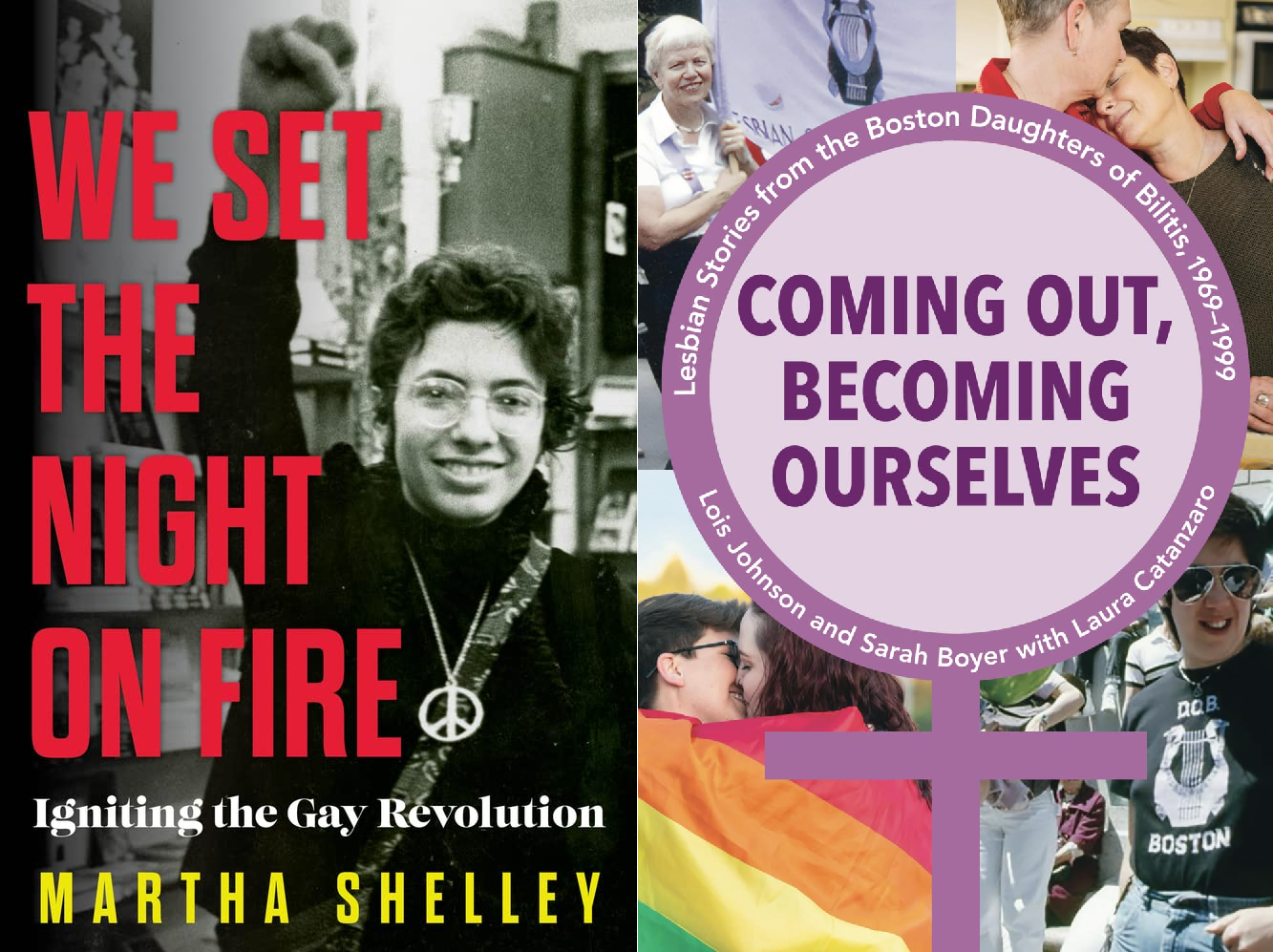Review of We Set the Night on Fire: Igniting the Gay Revolution by Martha Shelley and Coming Out, Becoming Ourselves: Lesbian Stories from the Daughters of Bilitis, 1969-1999 by Lois Johnson and Sarah Boyer with Laura Catanzaro

We Set the Night on Fire: Igniting the Gay Revolution
Martha Shelley
Chicago Review Press, 2023, 224 pages
$27.99
Coming Out, Becoming Ourselves: Lesbian Stories from the Daughters of Bilitis, 1969-1999
Lois Johnson and Sarah Boyer with Laura Catanzaro
Savvy Press, 2024, 302 pages
$21.95
Reviewed by Julia M. Allen
Two important new books chronicle the deep lesbian feminist histories often occluded by our June celebrations of parades and rainbows. Reading Martha Shelley’s We Set the Night on Fire in tandem with Lois Johnson and Sarah Boyer’s Coming Out, Becoming Ourselves, one becomes aware of the linkages between the Daughters of Bilitis (DOB) and upstart groups such as the Gay Liberation Front (GLF) and Radicalesbians, linkages that led to increased lesbian activism and visibility. Johnson and Boyer offer a history of the Boston chapter of the Daughters of Bilitis, while Shelley narrates her own development from studious daughter to militant writer and strategist in the radical feminist and gay rights movements.
Both books began in a shared moment in 1969. On June 28, two women from Boston arrived in New York to consult with DOB member Martha Shelley about starting a chapter. (Although readers may find it confusing that the names in the two accounts do not match, this is an artifact of the era, when women often used pseudonyms in lesbian organizations, as a matter of protection.) Shelley took them on a tour of Greenwich Village, whereupon they ran smack dab into the Stonewall riot. This alarmed the Bostonians, although Shelley dismissed the uproar, thinking it was a protest against the war in Vietnam.
At that point in the books, the two narratives diverge. We learn that when Shelley realized what they had witnessed, she began agitating for a response, and a month later, five hundred people marched in protest against the police raids on gay and lesbian bars. Johnson and Boyer say simply, “[The trip to New York] was the same weekend as the Stonewall uprising.”
After providing readers with a brief summary of the political climate in the US during the 1950s and the founding of the DOB in 1955 by Del Martin and Phyllis Lyon, Johnson and Boyer devote the first half of their book to describing, with justifiable pride, the thirty-plus years of the Boston DOB, explaining the range of activities offered by the group and the political and educational work done by members. They focus on the most significant—the “rap” groups, where participants could talk about any aspect of lesbian life in a congenial atmosphere. They also point to the joyous Thanksgiving dinners hosted for years by Johnson and her partner Sheri Barden, offering community to those whose families of origin may have been less welcoming. Following this overview, Johnson and Boyer give us glimpses into the lives of DOB members, offering over fifteen edited transcripts of oral history interviews, almost all now with real names. Many of the stories follow a recognizable arc, from trauma, fear, and loneliness to safety in the DOB. The book is generously illustrated with color photos.
Like Johnson and Boyer, Martha Shelley also takes us back in time, narrating her own pre-Stonewall life in New York City, documenting the crescendo of humiliations endured by girls as they reached adolescence and thus setting the scene for her subsequent actions. From there, she traces the routes of her activism as it exploded after the post-Stonewall march she had instigated. She was a founding member of the Gay Liberation Front; she joined Rita Mae Brown and others in carrying out the Lavender Menace action at the National Organization for Women’s Second Congress to Unite Women; she wrote for and typeset Come Out!, the publication of the Gay Liberation Front; she organized women to protest the incarceration of Angela Davis at the Women’s House of Detention; and then she moved to Oakland, California, joining Judy Grahn and others in the Women’s Press Collective.
While narrating these extraordinary efforts and achievements, both Shelley and Johnson and Boyer take care to recognize the accomplishments of others. Who among us knew, for instance, that NYU Student Homophile League member and GLF activist Ellen Broidy, with Craig Rodwell, owner of Oscar Wilde Memorial Bookshop, first proposed what have become the annual Pride marches? And how many of us recognized the courage of the rank-and-file DOB members who came out to march carrying the DOB banners?
Although I appreciated the many life stories offered by Johnson and Boyer, I did find certain elements could be repetitive, and variations in voice seem to have been muted in many cases. I also wish that the authors had supplied an index. Likewise, I wish Martha Shelley had included a selection of her writings from the era, as many are now difficult to locate.
Nonetheless, Johnson and Boyer do provide a useful appendix with directions for rap leaders, a timeless document that current organizers can now consult, and Shelley has packaged her own hard-won advice for future activists. They offer these gifts because they know, as we all do, that our work is far from finished.
Julia M. Allen is Professor Emerita, English, Sonoma State University. She is the author of Passionate Commitments: The Lives of Anna Rochester and Grace Hutchins, SUNY Press, 2013 and co-author with Jocelyn H. Cohen of Women Making History: The Revolutionary Feminist Postcard Art of Helaine Victoria Press, Lever Press, 2023.
"Empowerment comes from ideas."
― Charlene Carruthers
"Your silence will not protect you."
— Tourmaline
"Gender is the poetry each of us makes out of the language we are taught."
— Leila Raven


